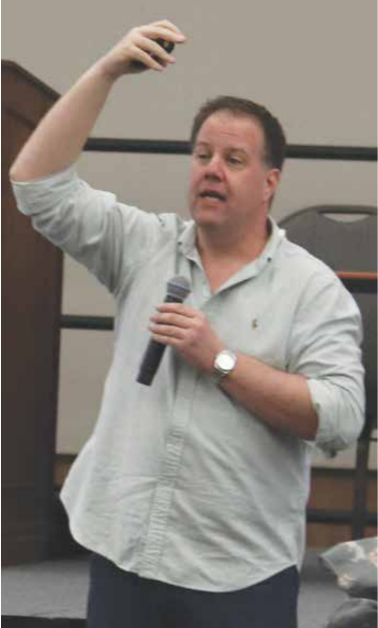
Speech Panel Discussion Thursday, Sept. 20. Photo by: Hunter Pariseau I Interim Photographer
Freedom of speech is a complex issue, so Ferris hosted its first Five-Star event of the year with a discussion on the topic.
The Free Speech Panel Discussion took place 7 p.m. Thursday, Sept. 20, in the University Center and featured four individuals: Ferris adjunct professor of history Christian Peterson, Ferris Dean of Student Life Joy Pufhal, Ferris Director of Public Safety Bruce Borkovich and attorney, author and student advocate C.L. Lindsay III.
“As far as I’m concerned, the free speech issues that are most important at universities deal with having students be put in an environment that exposes them to the widest range of possible ideas, even ideas that will make some uncomfortable,” Peterson said.
Lindsay refreshed students on the First Amendment and high-profile news cases focused on the issue of free speech, such as the Charlottesville white supremacist rallies that occurred in 2017. The First Amendment states, “Congress shall make no law respecting an establishment of religion or prohibiting the free exercise thereof; or abridging the freedom of speech, or of the press; or the right of the people to peacefully assemble, and to petition the Government.” However, the topic can get complicated when exceptions come up, especially in an educational setting.
There are several exceptions to free speech, such as obscenity, child pornography, threats, fighting words that cause violence and harassment from colleges.
Ferris political science sophomore Allyson Faulkner echoed those ideas and said that free speech should be respectful.
“You can say something that’s controversial and say it in a nice way. You don’t have to be aggressive about it and attack someone over their opinions and what they think, but you can still have opposing opinions and respect each other,” Faulkner said.
Ferris heavy equipment freshman Lorin Burch said students should attend these events to gain a better understanding of why the First
Amendment is in place.
“If you want to get the full college experience, events like this are crucial,” Burch said. “We should be exposed to these things so that we
have an understanding of maybe why they are offensive, why don’t we say them, where did that historical aspect come from.”
During the panel discussion, Borkovich said that students do not have to see those with which they disagree as enemies.
“I think developing the tolerance and the understanding that someone can be and think differently than you and they’re not your enemy; you don’t need to hate them, you don’t need to start a war… the challenge on a college campus is understanding everyone has a right to
express those opinions,” Borkovich said.
From a national standpoint, free speech continues to be complicated when it applies to high-ranking individuals, such as President Donald Trump.
“Some of the things that Donald Trump says are pretty offensive,” Burch said. “Some people saw it as he’s kind of using Twitter as his own media outlet … I think that’s something Donald Trump has done, is not sugar coat anything.”
Ultimately, the panelists stressed the ideas that everyone has a right to free speech, but free speech is not necessarily free from consequences.
“One of the most powerful things we can do is provide the alternative speech, and another thing that we can do, that is often very powerful, is if you don’t like the message, don’t provide an audience,” Pufhal said.
